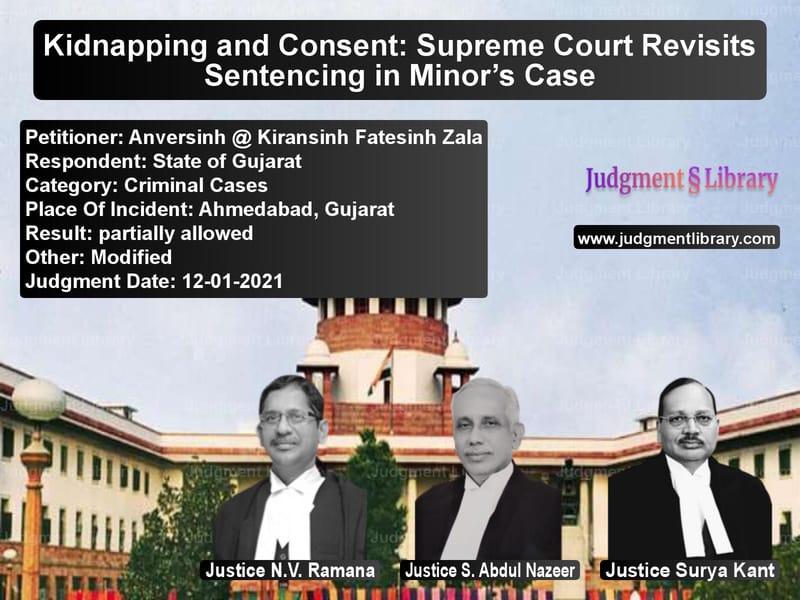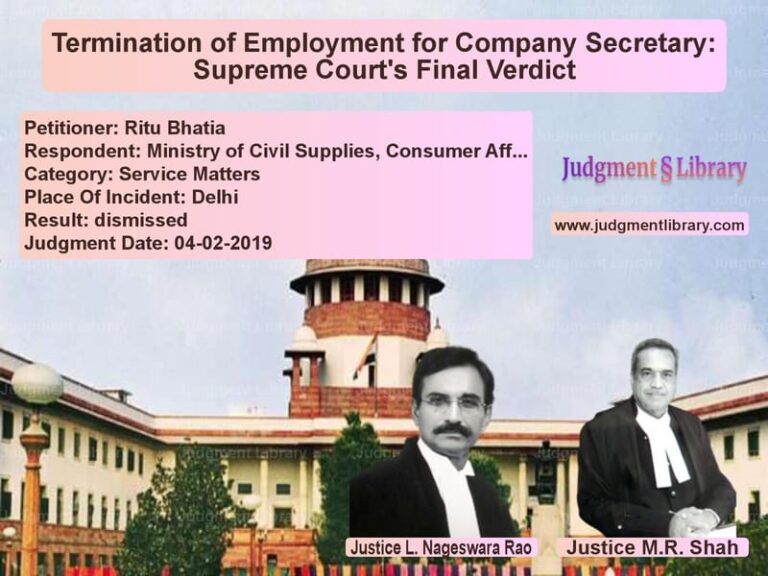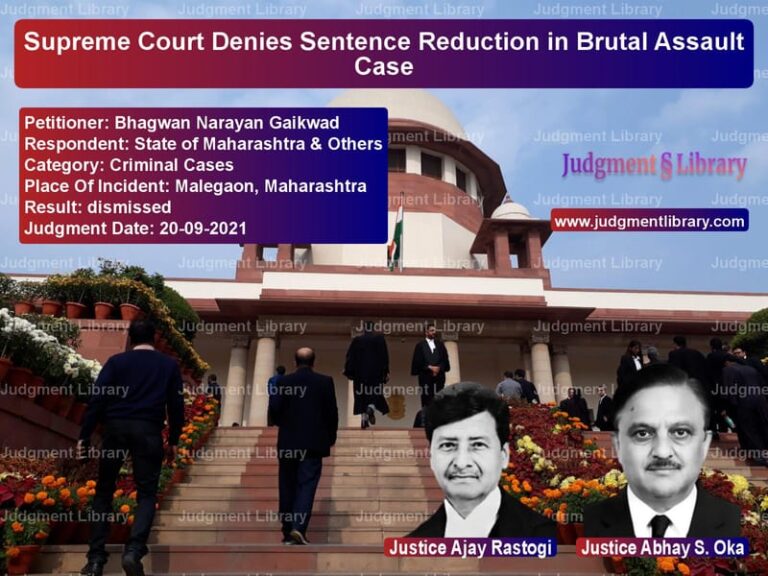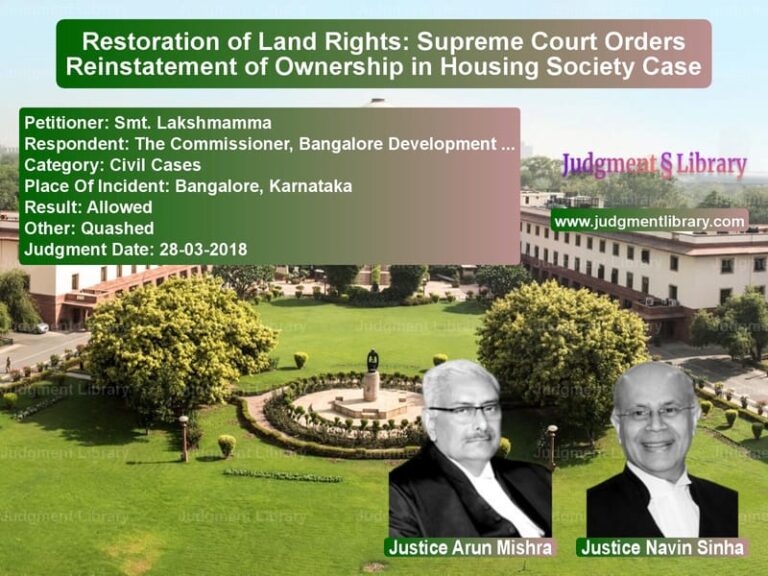Kidnapping and Consent: Supreme Court Revisits Sentencing in Minor’s Case
The Supreme Court of India, in a significant judgment, examined the legal principles surrounding the charge of kidnapping in cases involving a minor’s alleged consent. The case, Anversinh @ Kiransinh Fatesinh Zala vs. State of Gujarat, involved the conviction of the appellant under Sections 363 and 366 of the Indian Penal Code (IPC), with the High Court of Gujarat overturning the conviction under Section 376 IPC.
The case revolved around a young girl who had left home with the appellant, with whom she shared a romantic relationship. The prosecution argued that despite any alleged consent, the girl was a minor and thus incapable of providing lawful consent. The Supreme Court, while affirming the conviction, reduced the appellant’s sentence, citing unique circumstances.
Factual Background
On May 14, 1998, the complainant, the father of the prosecutrix, discovered that his daughter had not returned home from work. The 16-year-old prosecutrix, educated till Class VII, worked as a domestic maid. Upon inquiry, it was found that she was last seen with the appellant near a vacant bungalow. The father’s search for his daughter led him to the appellant’s home, but she was not found there.
A missing complaint was filed on May 16, 1998. Eventually, both the prosecutrix and the appellant were found at a farm near Modasa and brought back to Ahmedabad. Medical examination confirmed sexual intercourse had occurred.
The prosecution presented eight witnesses and multiple documents to establish that the appellant had forcibly taken the prosecutrix with the intent of marriage and subjected her to sexual intercourse against her will. The prosecution’s argument centered around the fact that she was a minor and thus incapable of legally consenting to the act.
Key Arguments
Prosecution’s Claims
- The prosecutrix was only 16 years and 3 months old at the time of the incident, and as a minor, her consent was legally irrelevant.
- She was forcibly taken and was under the appellant’s custody until being rescued by the police.
- The prosecutrix was sexually exploited and compelled to cohabit with the appellant as his wife.
- The testimony of her father and other witnesses supported the claim that she had not returned home voluntarily.
Defense Arguments
- The appellant contended that the relationship was consensual and that the prosecutrix had willingly accompanied him.
- The prosecutrix admitted in her testimony that she was in love with the appellant and had engaged in consensual intercourse prior to the alleged incident.
- There was no evidence of forceful abduction, and the prosecutrix had numerous opportunities to raise an alarm but did not do so.
- The defense relied on the judgment in S. Varadarajan v. State of Madras, arguing that if a minor voluntarily leaves her guardian’s custody without enticement or force, it does not constitute kidnapping.
Trial and High Court Rulings
The Additional Sessions Judge convicted the appellant under Sections 363, 366, and 376 IPC, awarding a ten-year sentence for rape, five years for kidnapping with intent to marry, and one year for simple kidnapping.
On appeal, the High Court of Gujarat overturned the rape conviction under Section 376 IPC, recognizing the consensual nature of the relationship but upheld the kidnapping charges under Sections 363 and 366 IPC, stating that a minor’s consent is legally irrelevant.
Supreme Court Analysis
Can a Romantic Relationship Be a Defense Against Kidnapping?
The Supreme Court examined whether the appellant’s claim that the prosecutrix left her home voluntarily could be a valid defense against kidnapping charges. The Court referred to Section 361 IPC, which criminalizes the act of taking or enticing a minor out of the custody of their lawful guardian without consent. The Court noted that:
“A minor girl’s infatuation with her alleged kidnapper cannot by itself be allowed as a defense, for the same would amount to surreptitiously undermining the protective essence of the offence of kidnapping.”
The Court also reaffirmed the principle that “enticement” need not always be overt or forceful; even subtle persuasion can amount to kidnapping under the law.
Revisiting the Sentence
The Court acknowledged that while the conviction was justified, the sentence required reconsideration. It reduced the appellant’s punishment for the following reasons:
- Absence of Force: The act did not involve pre-planning, coercion, or violence.
- Young Age of the Accused: The appellant was only 18 or 19 at the time of the incident.
- Long Time Elapsed: The case had been ongoing for over 22 years, and both parties had since moved on with their lives.
- Nature of the Crime: The Court noted that this was not a case of exploitation but rather an instance of youthful indiscretion.
The Supreme Court, quoting from State of Madhya Pradesh v. Surendra Singh, emphasized that punishment should be proportional to the offense:
“Undue sympathy to impose inadequate sentence would do more harm to the justice system to undermine the public confidence in the efficacy of law.”
However, considering the mitigating factors, the Court reduced the sentence to the period already undergone by the appellant.
Conclusion
The Supreme Court reaffirmed that the consent of a minor is legally irrelevant in kidnapping cases but recognized the need for a nuanced approach in sentencing. The judgment strikes a balance between legal principles and the realities of human relationships, ensuring justice while preventing excessive punishment for youthful mistakes.
Petitioner Name: Anversinh @ Kiransinh Fatesinh Zala.Respondent Name: State of Gujarat.Judgment By: Justice N.V. Ramana, Justice S. Abdul Nazeer, Justice Surya Kant.Place Of Incident: Ahmedabad, Gujarat.Judgment Date: 12-01-2021.
Don’t miss out on the full details! Download the complete judgment in PDF format below and gain valuable insights instantly!
Download Judgment: anversinh-@-kiransin-vs-state-of-gujarat-supreme-court-of-india-judgment-dated-12-01-2021.pdf
Directly Download Judgment: Directly download this Judgment
See all petitions in Bail and Anticipatory Bail
See all petitions in Juvenile Justice
See all petitions in Judgment by N.V. Ramana
See all petitions in Judgment by S. Abdul Nazeer
See all petitions in Judgment by Surya Kant
See all petitions in partially allowed
See all petitions in Modified
See all petitions in supreme court of India judgments January 2021
See all petitions in 2021 judgments
See all posts in Criminal Cases Category
See all allowed petitions in Criminal Cases Category
See all Dismissed petitions in Criminal Cases Category
See all partially allowed petitions in Criminal Cases Category







